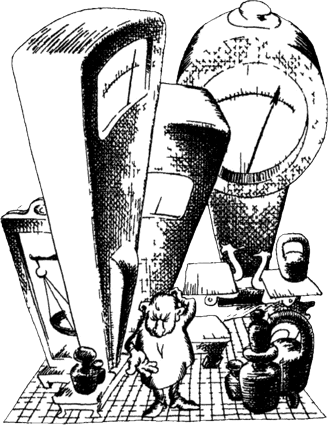107Stories About ChemistryINDEX |
88.
How to Weigh the Imponderable
Is 500 micrograms much? Let us see. One microgram is one thousandth of a milligram, or one-millionth of a gram. Hence, 500 micrograms is five ten-thousandths of a gram, or half a milligram. If we are talking about water, 500 micrograms is half of a cubic millimetre, about three times less than the volume of a pinhead. But what if the substance is ten times as heavy? Then its volume will be ten times less. Such an amount of substance is even difficult to discern. What could one do with it? Only examine it under the microscope, and nothing more. Still, five hundred micrograms of plutonium, and no more, was the amount available to American scientists in 1942. But having only this truly imponderable amount, they succeeded in studying the principal properties of the element. Furthermore, they studied them so thoroughly that a year later a large plutonium plant was being planned.  But during all kinds of chemical reactions chemists have had to resort repeatedly to weighing... Now what is there so complicated about a balance? A balance is a balance. Even an analytical microbalance which makes weighings to a hundredth of a milligram is fairly simple in design. However, such accuracy has long since ceased to satisfy scientists. Consequently, at the turn of our century a balance was designed for weighing to one ten-thousandth of a milligram. Incidentally, the English physicist William Ramsay used just such a balance to weigh about 0.16 cubic centimetre of radon and thus to confirm Rutherford�s hypothesis of the mechanism of radioactive decay of radium. But even this balance was not the limit. Somewhat later the Swedish chemist Hans Patterson constructed a balance which could weigh to ten-thousandths of a microgram, i.e., to 6�10�10 gram! Such accuracy is difficult even to imagine. The sensitivity of a modern ultramicrobalance is one two-millionth of what it can weigh. Super-precise weighing, weighing of the imponderable, is one of the achievements of a new science called ultramicroanalysis. And there are other no less important achievements it can boast of. Methods have been devised by means of which various chemical operations can be carried out with very minute volumes of substances, down to one ten-thousandth of a millilitre (cubic centimetre) to an accuracy which in a number of cases is no worse than about one ten-thousandth of a microlitre (1�10�10 litre). Ultramicrochemical methods find extensive usage not only in biological and biochemical investigations, but especially in the study of the artificial transuranium elements. |





